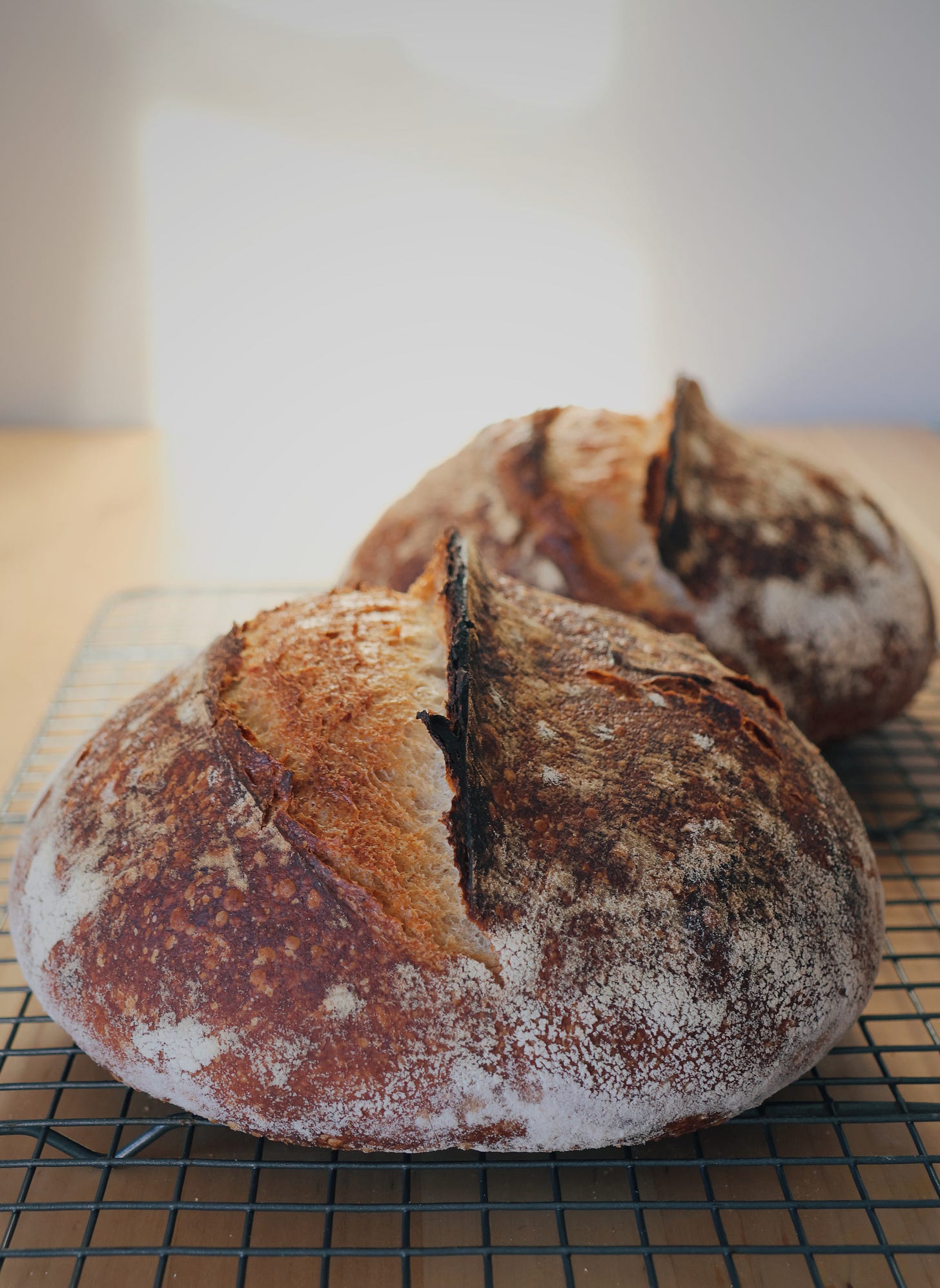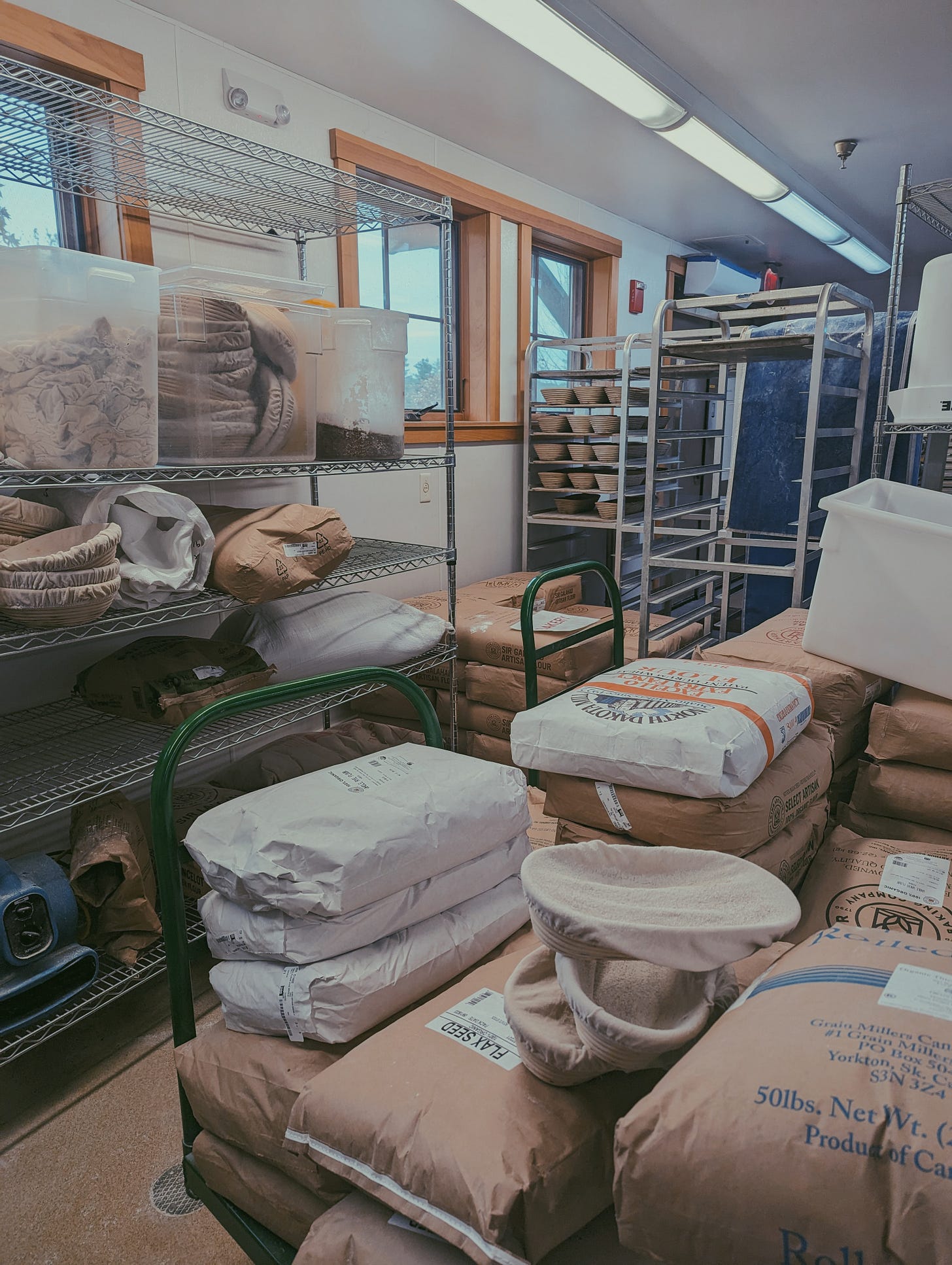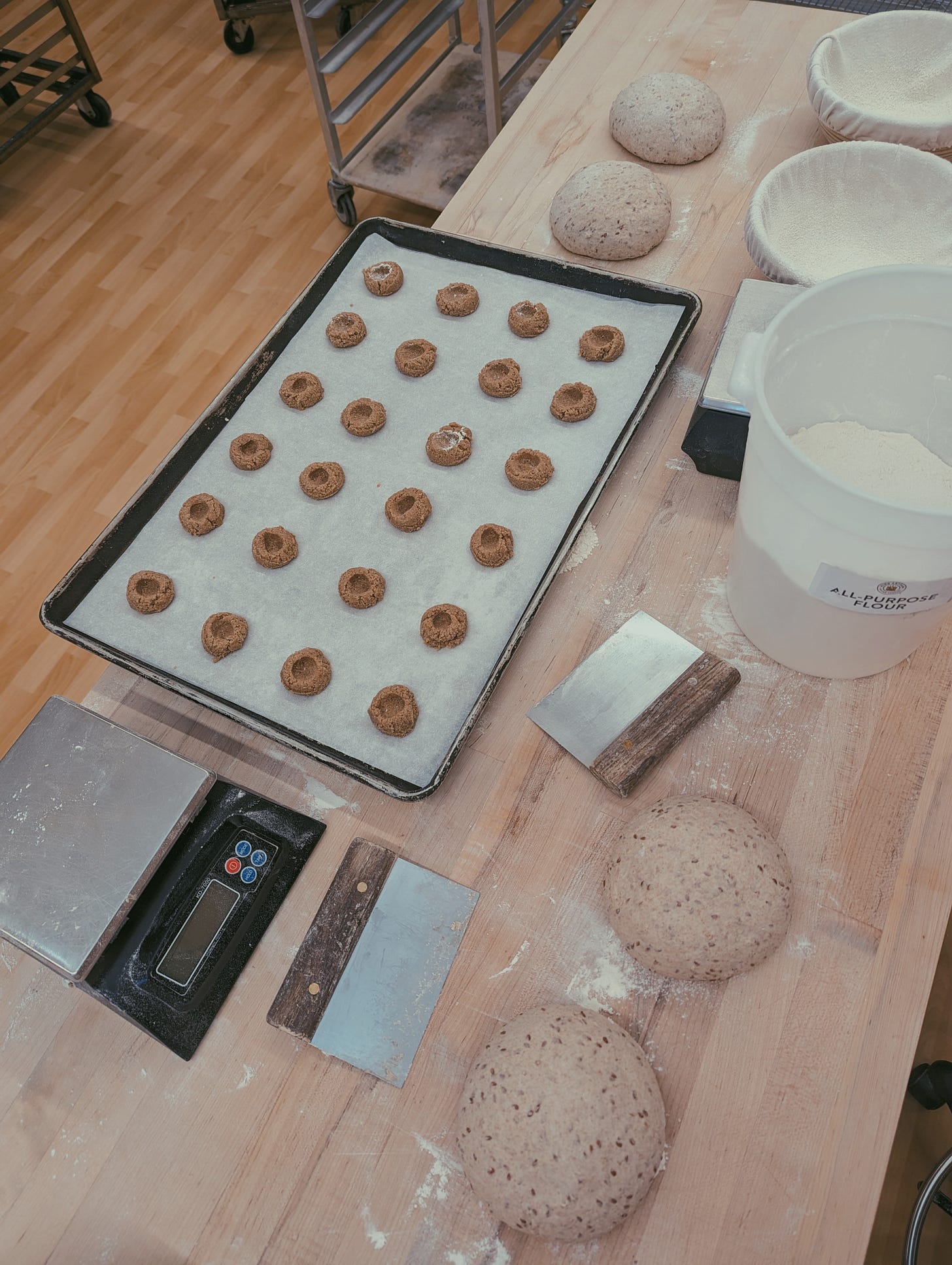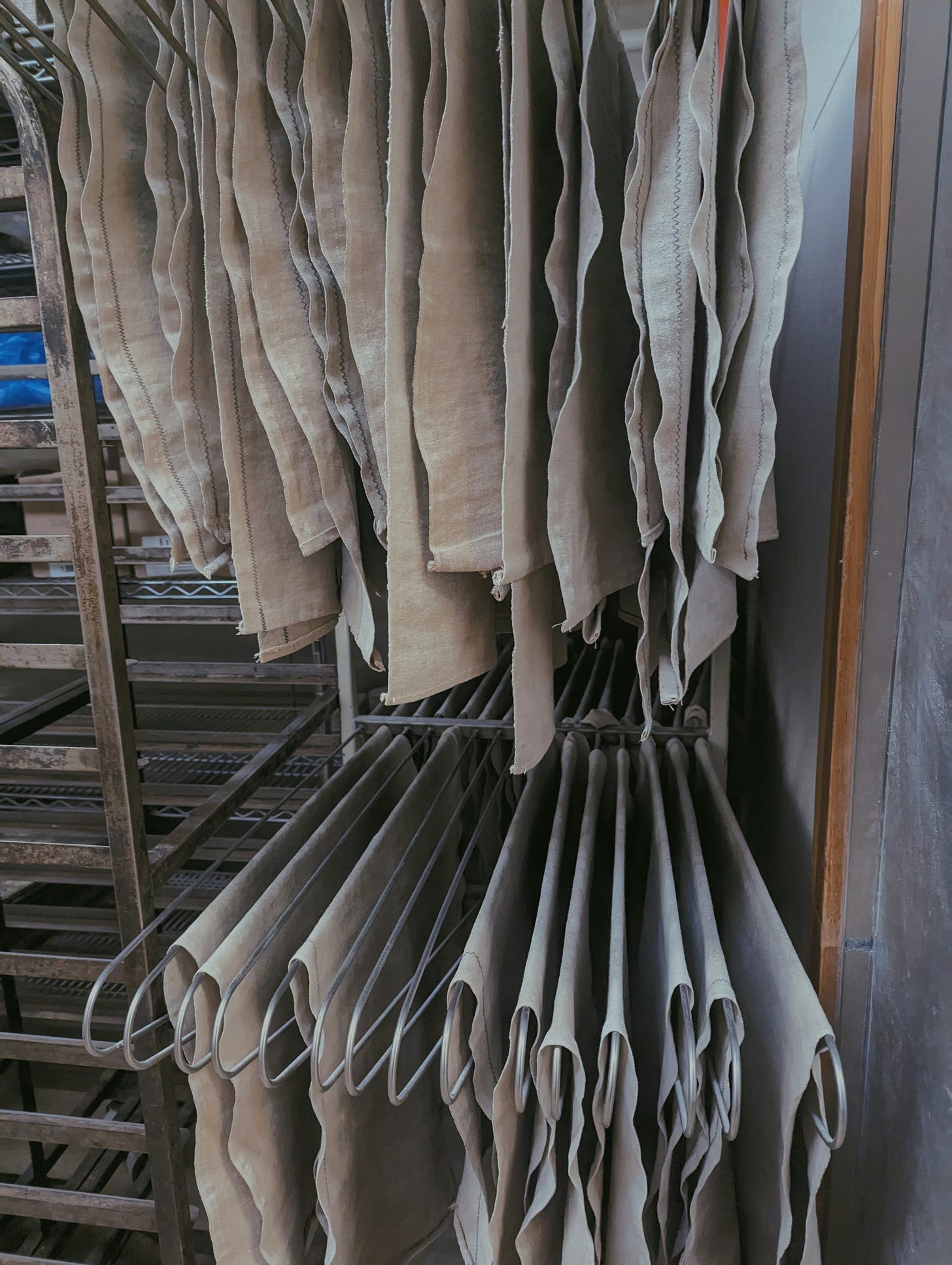Explorations in sourdough (and a lot of life lessons)
Reflections from a baking class with Jeffrey Hamelman and Carrie Brisson at King Arthur Baking School in Norwich, Vermont.
Hi there!
It’s been a crazy few weeks (I feel like I’ve been saying that a lot in 2023). I am really excited to have recently accepted a new role at the company I work for and am in the midst of figuring out how to manage that transition and set myself up to succeed. Plus, my kids are October and November babies so when you add birthday celebrations to all the holidays at this time of year, it feels like the planning never ends. My plate is filled to the brim right now, so in order to take care of myself (and aforementioned children) this is going to be my last post until 2024.
This newsletter began in February 2023 and I’m so proud of how it has grown. I’ve gotten to collaborate with so many people that I love, and have so many more that I want to work with in 2024. Additionally, thanks to your generosity through paid subscriptions, this newsletter community was able to:
Send $350 worth of food packages to incarcerated people at Fishkill and Woodbourne Correctional Facilities
Donate $50 to Bard Prison Initiative
Thank you so much for reading, and I hope you have a wonderful, restful holiday season!
- Brittany
If you’ve never made sourdough bread, it might seem weird (cough annoying) to you how much people who make it obsess over it.
I’m sorry to say that I think the only way you could understand them is by trying to make it yourself. It’s not like baking a batch of chocolate chip cookies, where you can quickly pull out ingredients and have a finished product in your hands in less than an hour.1 Baking a great loaf of sourdough bread is a lifelong project and pursuit that can, on some days, come relatively easily, and on other days, feel doomed.
The excitement emanating from any baker who’s just baked a successful loaf is a reflection of the reality that the more effort something requires from us, the more triumphant we feel when it turns out well.
For starters, it takes daily dedication to maintain an active sourdough culture. The culture thrives when it’s fed in a predictable rhythm, and this metronomic pattern ultimately separates the people who’ve left their starter unfed in the refrigerator for weeks at a time from those who’ve diligently cared for it. Most of us bread bakers start with commercial yeast, and then, once feeling somewhat masterful, begin to get curious about sourdough.
I began baking bread in elementary school with my Grandma Rachel. She would often set up a chair for me to stand next to her kitchen counter and teach me how to make the same, delicious loaf of white sandwich bread. We’d mix and knead the dough, then head into the living room to watch women cooking on TV, like Ina Garten or Rachel Ray, while it rose on the stovetop next to her ashtray.
During commercial breaks, we’d run to the kitchen together to peek under the towel at the dough and occasionally poke our fingers into it to determine if it was ready to be shaped.
It wasn’t until 2017 that I began experimenting seriously with sourdough, setting the comfortable predictability of commercial yeast to the side to see if I could produce bread with a sourdough culture. There are so many variables, and until you cut into a loaf, it’s hard to know whether you’ve been successful. Hundreds of tiny decisions compound to determine your success. Once you have had success, the final product is one of the most heavenly-tasting things on earth: a crusty, pillowy, tangy loaf of bread.
After a few years of baking sourdough on my own, I began an annual tradition of taking a trip to Norwich, Vermont to King Arthur Baking School for multi-day sourdough baking classes. Over the years, I’ve been cobbling together my own slow-moving version of culinary school, with a major in bread baking.
On my first trip in February 2020, I purchased a copy of Jeffrey Hamelman’s book, Bread: A Baker's Book of Techniques and Recipes from the King Arthur store. I remember students in my class stopping mid-mixing to stare one day as Jeffrey just happened to walk into our room for a minute to say hello to our group. I got a quick glance of him but didn’t introduce myself.
Truthfully, showing up to the baking school classes has always made me nervous. It’s intimidating to be in a room full of people so passionate and knowledgeable about baking. This year I signed up for a professional-level class called “Explorations in Sourdough” led by Jeffrey Hamelman and Carrie Brisson, and on my drive up to Vermont from New Jersey, I had a few moments where I fantasized about not showing up for the class at all.
In particular, I wondered if my teachers might be offended by my lack of expertise and think I was out of place. Jeffrey Hamelman has long been my north star when it comes to bread. In addition to writing the main text that I have turned to for everything bread-related, he’s also one of the few Certified Master Bakers in the United States, held the position of Bakery Director at King Arthur Bakery (where he established the baking education center and production bakery), and much more. Carrie Brisson is currently the Head of the Bakery at King Arthur Bakery and was once a student of Jeffrey’s herself.
Upon entering the class and earning a giggle from my teachers and classmates as I introduced myself and explained that “I’m not really a professional, I just self-promoted myself to professional because I’ve taken a lot of classes,” my fears of not being good enough for the class quickly dissipated.
With those worries out of the way, I was able to let this once-in-a-lifetime experience really sink in over three days.
It was one of those things in life that while you’re living it, you know it is something you’ll remember for the rest of your life. Writing about it here is one way I hope to hold onto what I learned.
I learned to think of the end — from the beginning. When you’re setting out to make a loaf of bread, you have to begin with the end product in mind. What exactly are the characteristics that you’re looking for? When you imagine the desired product coming out of the oven, it helps to figure out your path forward. You make adjustments along the way with the end goal in mind.
I learned to be precise, but also embrace uncertainty. Set out to feed your sourdough starter with an exact amount of flour and water each day, and then go ahead and change your calculations based on factors like the weather. Whatever you do, don’t stop caring for your starter: as Jeffrey explained, the sourdough needs to eat seven days per week too, and it takes less than four minutes per day to keep it alive. He’s been doing it since 1980, which as he stated it felt to me like a challenge to see if we can keep the torch burning.
There were a handful of students asking him to speak in absolutes — one even asking exactly how many air bubbles you might want to look for on the top of a properly leavened 90% rye bread dough. He smiled, paused silently, and reminded them not to overcomplicate things. Not because great bread is uncomplicated, but because there isn’t an exact answer to everything. The only way to judge your success is to pull the bread out of the oven and eventually taste a slice. Each minor decision adds up to the end results.
I learned that the most valuable tool a baker has is their hands. As Jeffrey explained, one of his earliest teachers told him to “see with your hands.” Throughout our time in class, we were constantly touching the dough at various stages to get a tactile sense of what was going on inside. If we hadn’t touched the dough, he rightfully did not want our opinion on it. He reminded us that the only value of things like timers and schedules in bread baking is that they can remind you that you need to go and make an assessment with your hands.
Spending time with Jeffrey reinvigorated my dedication to bread making as a serious craft but also allowed me to relax about how it doesn’t always go right. I began seeing myself more like a scientist, feeling curious about each step in the process, and less like a piece of machinery in a factory that is expected to churn out one consistent result every time.
In fact, one of my favorite moments in the class was when one of our batches of bread seemed doomed to fail. After a sluggish rise on the first day, we decided to leave them overnight to continue to rise. The next day, when we tried to remove them from their bannetons, the majority of them were stuck and required a lot of prying, resulting in messy tops and somewhat deflated dough. But once we pulled them out of the oven, they actually looked beautiful. One student aptly proclaimed, “they’re better than they have the right to be.” When I told Jeffrey the next day that I thought it was a nice moment to experience together, because it’s something that has happened to me at home, he seemed relieved. He noted that other people might think they came to a class with Jeffrey Hamelman and that kind of thing shouldn’t happen.
Relatedly, speaking to the whole group, he reminded us to not be extreme in our personal development as bakers: don’t be neurotic and always think you’re not good enough; and don’t be overly proud, always patting yourself on the back. Keep looking for the next level of growth. And if there’s one thing you should never do, he said in a tone both joking and serious, it’s brag about a high-hydration dough on Instagram, or call yourself an “artisan.”
At the end of a long day of baking, Jeffrey sat down and looked at us, our hands and aprons covered in flour, and said, “Isn’t making bread fun?” As we nodded, he continued, “Especially when you get to do it with other people.”
It’s not often that you get a living memento from a memorable experience, but mine is bubbling away right now on my kitchen counter. It was born on August 28, 1980, and I can’t wait to keep it alive.
The baker in me wants to clarify that 1 hour is actually not the ideal amount of time for baking great chocolate chip cookies because it does not incorporate proper dough chilling time.







I’m so proud and inspired by you! 💛
Thank you Brittany! I hope your holidays are wonderful.
I think each of us will now be looking for our own "sourdough-equivalents" - everyone a lifelong of successes, failures and passion. : )